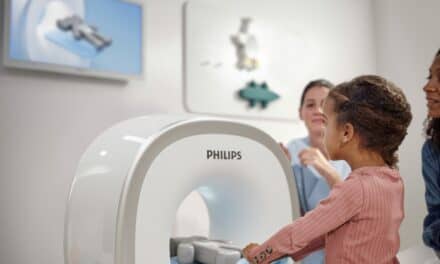Royal Philips and Marienhospital Stuttgart in Germany signed a 10-year strategic partnership agreement to expand treatment at the hospital and provide integrated patient care. The project will include renewal and ongoing development of the hospital’s diagnostic imaging equipment and associated IT systems, digitization of its pathology department, and enhancement of the hospital’s emergency medicine capabilities.
Rather than treating each of these improvement areas as a separate exercise, Philips and Marienhospital Stuttgart will integrate them into connected patient care and optimized efficiency solutions. This will involve analysis of the hospital’s current treatment structures and pathways to enhance the overall quality of the hospital’s structures, processes, and results, while also identifying potential cost savings. By jointly developing needs-based technology solutions, Marienhospital Stuttgart will be able to better plan its costs and ensure investment security in all areas.
“Due to the long-term nature of our partnership with Philips, our hospital will not only actively participate in future technological advances in healthcare, but also become a leader,” says Markus Mord, managing director of Marienhospital Stuttgart. “It will enable us to offer our patients diagnostic and therapeutic procedures that consistently meet the latest standards. We live medicine and always focus on the well-being of our patients.”
“As a solution provider, we specialize in partnering with our customers to provide integrated care concepts that enhance treatment pathways for their patients,” says Peter Vullinghs, managing director Philips DACH. “With new, highly innovative approaches, we will help to enhance the quality of medical care for the benefit of the patient across the board. We look forward to many years of mutual cooperation with Marienhospital Stuttgart.”
Reliable Diagnosis Through Digital Pathology
A core element of the collaboration is redesign of the hospital’s pathology department workflow, replacing conventional microscopes and glass slides with Philips’ high-performance digital pathology slide scanners and computer workstations. This will allow slide images to be managed, displayed, analyzed, and discussed with clinical colleagues—for example, during tumor boards for the diagnosis and treatment of cancers.
The ability to share slide images will also enable virtual consultations with experts from other hospitals. Competence networks like this combine the experience of doctors working in the clinic with the knowledge of their research colleagues, speeding up right-first-time diagnosis and the initiation of therapy.
Radiology for Current and Future Needs
Reflecting the holistic nature of the partnership model, Philips will also help to analyze and redefine Marienhospital Stuttgart’s radiology procedures, processes, and IT systems, as well as coordinating equipment renewal and expansion. Under the terms of the agreement, Philips will be responsible for the procurement, installation, maintenance (including updates and upgrades), and servicing of all large radiology equipment, with an obligation to ensure the availability of equipment in line with the strategic orientation of the hospital.
Emergency Medicine for Enhanced Patient and Staff Experiences
As the first point of contact for patients with acute health problems, Marienhospital Stuttgart’s Clinic for Emergency Medicine plays a central role in its care concept. A working group from Philips and the hospital has already examined the clinic’s current status and development potential against the background of a holistic care approach, including assessment of patient safety, processes, procedures, technical equipment, and staff working conditions. The knowledge gained from this will be incorporated into the clinic’s future structural planning and implementation.





